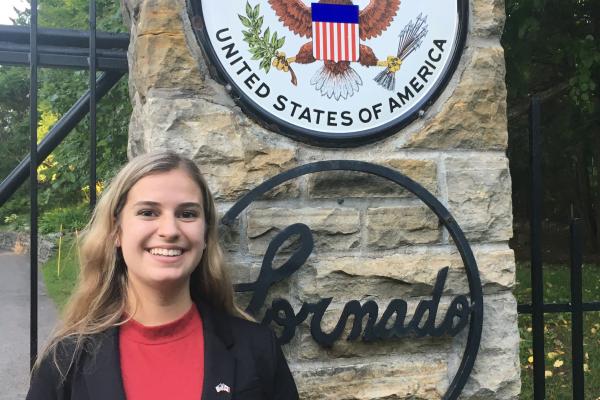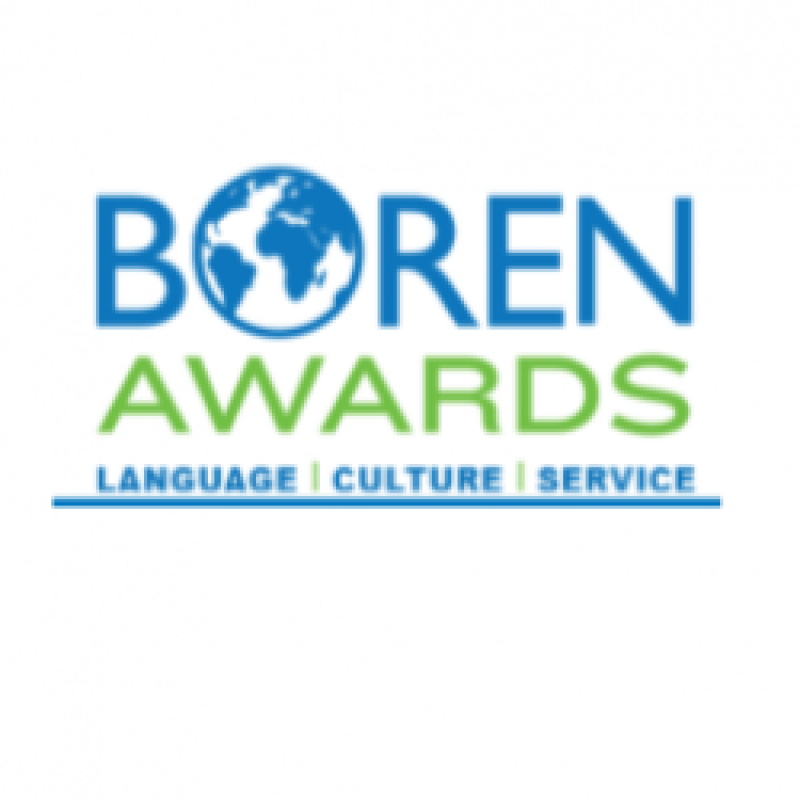Natalie Antonik Receives Boren Award for 2019-2020!

Congratulations to Natalie Antonik, recipient of a 2019-2020 Boren Scholarship, an initiative of the National Education Security Program. Boren Awards provide up to $20,000 to U.S. undergraduate students, and up to $24,000 to U.S. graduate students, to study abroad in areas of the world that are critical to U.S. interests and underrepresented in study abroad, including Africa, Asia, Central and Eastern Europe, Eurasia, Latin America and the Middle East. Boren Scholars study less commonly taught languages including, but not limited to, Arabic, Chinese, Korean, Portuguese, Russian, and Swahili.
Natalie is a third-year international studies major who has also been selected to receive a Critical Language Scholarship to study intensive Indonesian for summer 2019. She will be taking classes at Waseda University in Tokyo Japan from September 2019 to July 2020, which includes intensive Japanese language coursework as well as classes housed in the School of International Liberal Studies. Natalie shares below how this experience will be significant not only to her academic and professional trajectory but also to U.S. security interests abroad.

"I consider Japan to be our most valuable ally in East Asia. With a significantly large number of US troops stationed in Japan in order to ensure regional stability and prosperity, it is necessary for us as Americans to continue to strengthen and improve our military and diplomatic relations. With multi-lateral policy towards North Korea becoming more and more crucial, our strong coalition with Japan is more important now than ever.
I also believe US-Japan economic relations are extremely significant. While the US imports several high-technology goods such as state-of-the-art vehicles from Japan, I believe the US also has many opportunities to improve the climate for US investors in Japan in order to expand access to Japan’s market and increase direct investment. Furthermore, our shared involvement in several international organizations such as the United Nations, ASEAN, and the G7 allows us to collaborate and work with each other in order to pursue our shared goals in East Asia.
I am very interested in US-Japan military relations and East Asian regional security issues. One of the most memorable classes I have taken at my university is East Asia Post-Cold War. In this class, I learned about East Asian regional security and economic issues in the post-Cold War era. This is when I became intrigued in the complexity of East Asian geopolitics. I was especially interested in policy towards North Korea and how the US was interacting with Japan and South Korea in order to create strong coalitions on the matter. I feel that stronger communication and multilateral policy between the US, Japan and South Korea is necessary in order for an effective and permanent solution to the North Korean nuclear crisis to be put in action. This class inspired me to want to become a part of the team of Americans creating and enacting foreign policy in East Asia and around the world.
As a Japanese major, I have been studying the language for two years at my university. For the past two semesters I have been taking intensive Japanese classes, which equates to one year of Japanese per semester. While at times it has been academically challenging and demanding, I have found intensive language study to be especially rewarding and motivating. It’s so exciting to see how much progress has been made throughout the semester and it inspires me to continue putting in the time and hard-work to study every day.
After I complete my undergraduate education, I would like to go to graduate school and continue to study international relations and Japanese. Upon graduating, I would like to become a Foreign Service Officer for the State Department, which is what I would pursue as my service requirement for this scholarship. My goal is to be stationed at the embassy in Tokyo. I would like to work on improving our diplomatic relations with Japan and crafting solutions to ongoing security issues such as the North Korean nuclear crisis and the Senkaku Islands dispute.
I believe that my past experiences will help prepare me for my future career goals. This past summer, I interned for a Member of Parliament in Canada. My duties included but were not limited to drafting speeches for my Member of Parliament, conducting research on key issues, and attending committee meetings. I learned so much during this internship, especially how to communicate and discuss values with people from other countries. While Canada may not seem to be the most foreign of countries, there were still many cultural and ideological differences I encountered during my internship. From my daily interactions with members of a foreign government, I learned how important it is to strike a balance between actively listening to and respectfully sharing opinions. This experience will help prepare me for my time abroad in Japan, not only for my day-to-day interactions with fellow peers, but also for my future career at the embassy working alongside my Japanese government counterparts.
While I’m in Japan next year, I will be taking classes on Japanese foreign policy and security issues. By gaining a non-Western perspective on Japan’s international relations, I believe I will acquire the unique insight necessary for crafting long-lasting and effective US-Japan foreign policy. During my year abroad, I would also like to research civic engagement in Japan and learn more about political thought amongst citizens. I am interested in domestic politics in Japan and I’m really looking forward to becoming involved in local politics and gaining a first-hand insight on the topic."
